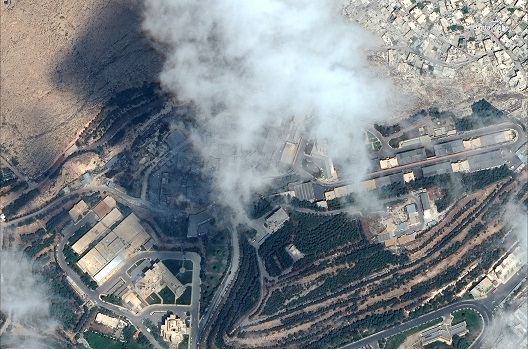 Two unsurprising reactions followed in the immediate wake of the recent air attacks on Syrian chemical warfare facilities: Western commentators praised the raids while lamenting the absence of a Trump administration “Syria strategy;” and Bashar al-Assad defiantly declared victory while resuming aerial assaults (albeit non-chemical) on rebel-held residential neighborhoods. One might employ a medical analogy to appreciate the depth of malpractice being displayed: as the patient is dying from arterial bleeding, the physicians debate the surgical alternatives.
Two unsurprising reactions followed in the immediate wake of the recent air attacks on Syrian chemical warfare facilities: Western commentators praised the raids while lamenting the absence of a Trump administration “Syria strategy;” and Bashar al-Assad defiantly declared victory while resuming aerial assaults (albeit non-chemical) on rebel-held residential neighborhoods. One might employ a medical analogy to appreciate the depth of malpractice being displayed: as the patient is dying from arterial bleeding, the physicians debate the surgical alternatives.
Ultimately, the United States wants to see the emergence of a peaceful Syria; one in which consent of the governed yields stabilizing legitimacy; a country at peace with its neighbors, recovering economically, and inclined to cooperate with Washington in the region and beyond. In the best of circumstances such a scenario will not take hold on its own, much less in the next twenty minutes. What is needed is a long-term strategy to bring it about: a strategy dedicating resources, attracting allies, and transcending the partisan tribalism of American domestic politics.
But first the bleeding must stop. The fixation of the West on a murder weapon—chemical munitions—rather than murder itself is unintentionally but decisively facilitating mass homicide in Syria. As noted repeatedly by this writer, a person of Bashar al-Assad’s abysmal cynicism sees a red line restricted to chemicals as a green light for anything else he wishes to use against civilians. He has proved the truth of this observation after all three chemical crises: the red line fiasco of 2013; the American retaliation of April 2017; and now, in the aftermath of a second set of American missile strikes.
If the bleeding does not stop, step one of whatever strategy is adopted is decisively blocked. Nothing good will happen in Syria—“good” being defined as developments consistent with the objective defined above—so long as civilians are targets of Assad’s military assets. And they have been the principal regime targets from the beginning: a regime that has largely ignored ISIS (ISIL, Daesh, Islamic State) and other al-Qaeda-descended organizations for the sake of live-and-let-live, a useful situation for a regime claiming to be a bulwark against Islamist extremism. A sustained state terror campaign featuring mass homicide, forced displacement, starvation, disease, torture, and sexual abuse has been the political survival strategy of choice for a larcenous family and its fawning entourage.
If the American objective is simply, “Let Assad win and let God sort it out,” an appropriate strategy would involve sermonizing and bombing over occasional chemical use while sermonizing alone as hospitals, schools, mosques, and marketplaces are targeted constantly with barrel bombs and conventional high explosives. This strategy is the way toward disaster. Once Syria is massacred into submission, Iran and Hezbollah will have one fewer distraction as they try to build a new “resistance front” against Israel. Once the country is a smoking ruin nominally presided over by thieves, Russia’s Vladimir Putin will triumphantly demand reconstruction tribute of Europe lest another wave of desperate Syrian migrants be stampeded to the north and west. Once the writ of Assad is restored violently to the entire country, Sunni Islamists around the world will reach out to recruits with a message of Western complicity in Syria’s murder.
As matters now stand, “Let Assad win and let God sort it out” may as well be the administration’s objective. If the regime kills forty people with chemicals, the West responds with missiles. If the regime kills 4,000 with explosive-propelled shrapnel, oh well.
There is nothing wrong with articulating a positive objective and building an implementable strategy while avoiding, from the beginning, violent regime change, invasion, occupation, and direct combat with Russians and Iranians. But a policy that reacts with indignation and reprisal to murder by chemical while speechifying and wringing hands when children and their parents are mangled by barrel bombs and artillery shells is one that promotes regime survival and facilitates the objectives of adversaries.
Thinking through objectives and an implementing strategy for a problem as complex as Syria is no easy task. Yet it must be done. And doing it must draw on the political experience residing on Capitol Hill. But going through this lengthy and difficult process will be time wasted if mass homicidal business-as-usual—provided it is conducted with non-chemical munitions—is permitted to proceed unopposed in Syria. If it is, the patient will bleed to death before a life-saving procedure is agreed.
Frederic C. Hof is a nonresident senior fellow at the Rafik Hariri Center for the Middle East.
Image: Photo: A satellite image shows the Barzah Research and Development Center after being struck by U.S. and coalition operations in Damascus, Syria, April 14, 2018. Picture taken April 14, 2018. Satellite Image ©DigitalGlobe/Handout via REUTERS
